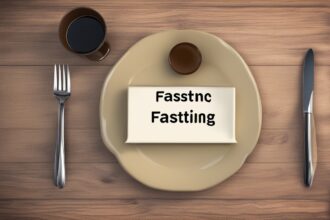Have you ever wondered what fasting really means and why it’s become such a buzzword in the health and wellness world? At its core, fasting is a practice that dates back centuries, rooted in cultural, religious, and health traditions. Today, it’s gaining traction for its potential to boost metabolism, improve mental clarity, and even support weight loss. In this post, we’re diving deep into the fasting definition, exploring its various forms, uncovering the science behind it, and sharing practical tips to help you get started. Whether you’re a curious beginner or a seasoned faster, there’s something here for everyone. Let’s break it down!
The fasting Definition: What Does It Really Mean?
When we talk about the fasting definition, it’s simply the act of abstaining from food, drink, or both for a specific period. Historically, fasting has been practiced for spiritual reasons across religions like Islam (during Ramadan), Christianity (Lent), and Hinduism. However, in a modern health context, fasting often refers to voluntary food restriction to achieve physical or mental benefits. It’s not about starvation but rather giving your body a break from constant digestion to focus on repair and renewal. Understanding this basic concept of what is fasting is the first step to appreciating its impact on health.
Different Types of Fasting: Finding What Works for You
Fasting isn’t a one-size-fits-all approach. There are several methods, each with its own structure and purpose. Some focus on weight management, while others prioritize detoxification or spiritual growth. Here are a few popular types of fasting protocols that align with the fasting definition in health contexts:
- Intermittent Fasting (IF): This involves cycling between eating and fasting periods, such as the 16/8 method (fast for 16 hours, eat during an 8-hour window).
- Water Fasting: Consuming only water for a set time, often 24–72 hours, to promote deep detoxification.
- Juice Fasting: Replacing meals with fresh juices to reduce calorie intake while still providing nutrients.
- Religious Fasting: Practiced for spiritual reasons, like Ramadan, where no food or water is consumed from dawn to dusk.
Each type has unique benefits and challenges, so it’s important to choose a method that aligns with your goals and lifestyle when exploring fasting benefits.
The Science Behind Fasting: How It Impacts Your Body
Now that we’ve covered the fasting definition, let’s look at what happens in your body during a fast. Scientifically, fasting triggers a process called autophagy, where cells clean out damaged components and regenerate. Studies, such as those published in the journal Cell Metabolism, show that fasting can reduce inflammation, improve insulin sensitivity, and even promote longevity. When you fast, your body shifts from using glucose as fuel to burning stored fat, entering a state called ketosis. This metabolic switch is why many people associate fasting for weight loss with effective results. Additionally, fasting gives your digestive system a rest, allowing energy to be redirected toward healing and repair.
Health Benefits of Fasting: Why It’s More Than a Trend
Beyond the basic fasting definition, the practice offers a range of health perks backed by research. While results vary based on individual factors like age and health status, fasting has shown promise in multiple areas. It can support weight management by reducing overall calorie intake and boosting metabolism. It’s also linked to improved brain function, with some studies suggesting it enhances focus and protects against neurodegenerative diseases. Furthermore, fasting may lower the risk of chronic conditions like type 2 diabetes by improving blood sugar control. However, it’s not a magic bullet—sustainability and balance are key to reaping these fasting health benefits.
Practical Tips for Starting Your Fasting Journey
If you’re new to fasting, jumping in without preparation can feel overwhelming. The good news? With a clear understanding of the fasting definition and a few strategies, you can ease into it safely. Fasting doesn’t have to be extreme; even short periods can make a difference. Here are some beginner-friendly tips to help you start exploring how to fast:
- Start Small: Begin with a 12-hour overnight fast (e.g., stop eating at 8 PM and eat again at 8 AM) before trying longer windows.
- Stay Hydrated: Drink plenty of water during fasting periods to avoid dehydration, especially during water or dry fasts.
- Listen to Your Body: If you feel dizzy or weak, break your fast with a light meal—don’t push yourself too hard.
- Plan Nutrient-Dense Meals: When you eat, focus on whole foods like vegetables, lean proteins, and healthy fats to support recovery.
- Consult a Professional: If you have medical conditions like diabetes, speak with a doctor before starting any fasting routine.
Remember, fasting is a personal journey. Experiment with different approaches to find what feels sustainable for you while keeping the core fasting meaning in mind.
Common Misconceptions About Fasting: Setting the Record Straight
Despite its growing popularity, fasting is often misunderstood. Some view it as a quick fix for weight loss or assume it’s the same as starving. Let’s debunk a few myths surrounding the fasting definition. First, fasting isn’t about deprivation—it’s a controlled, intentional practice. Second, it doesn’t necessarily mean zero calories; some methods allow small amounts of liquids like black coffee or tea. Lastly, fasting isn’t suitable for everyone. Pregnant women, children, and those with certain health conditions should avoid it. Clearing up these misconceptions helps ensure you approach fasting safely with realistic expectations.
In wrapping up, fasting is a powerful tool with deep historical roots and modern health applications. By understanding the fasting definition—abstaining from food or drink for a specific period—you can explore its many forms, from intermittent fasting to water fasting, and discover what suits your needs. The science shows promising benefits, like improved metabolic health and mental clarity, but it’s crucial to start slowly, stay informed, and listen to your body. Whether you’re drawn to fasting for weight loss, spiritual reasons, or overall wellness, it’s a practice that requires mindfulness and balance. So, why not give it a try with a short fast and see how it feels? Share your thoughts or experiences in the comments—we’d love to hear how fasting fits into your life!






